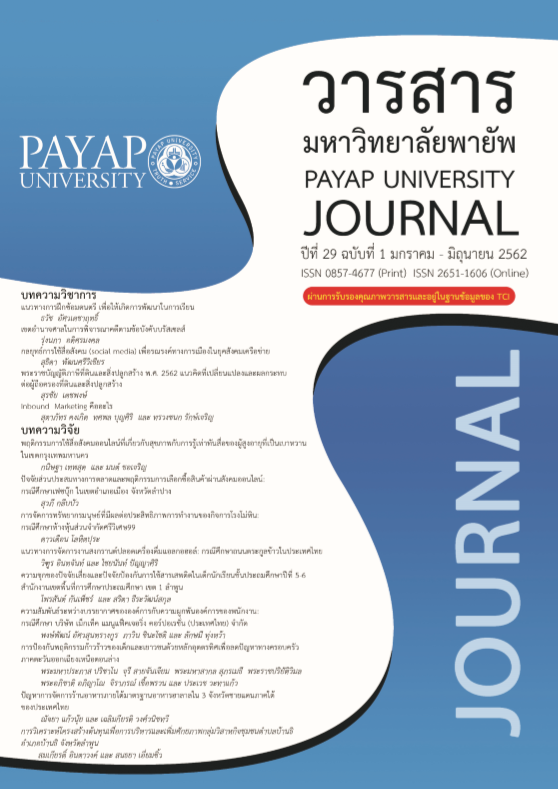กลยุทธ์การใช้สื่อสังคม (social media) เพื่อรณรงค์ทางการเมืองในยุคสังคมเครือข่าย
Main Article Content
บทคัดย่อ
บทความนี้ นำเสนอเนื้อหาเกี่ยวกับการรณรงค์ทางการเมือง โดยให้ความสำคัญกับการใช้สื่อซึ่งเป็นเครื่องมือหนึ่งที่ช่วยให้การรณรงค์ประสบความสำเร็จ เนื้อหาในช่วงแรกจะอธิบายถึงความหมาย ความสำคัญ และกลยุทธ์ที่ใช้ในการรณรงค์ทางการเมือง จากนั้นจะเป็นเนื้อหาที่เกี่ยวข้องกับการใช้สื่อ โดยเฉพาะสื่อสังคม (social media) ที่มีการใช้อย่างแพร่หลายในการเลือกตั้งสำคัญในระดับโลก จนทำให้ผู้นำประเทศหลายคนสามารถเอาชนะคู่แข่งและได้รับการเลือกตั้งในที่สุด ในส่วนนี้บทความได้กล่าวถึงประโยชน์ของการใช้สื่อสังคม ที่ช่วยให้ผู้ลงสมัครรับเลือกตั้งได้เผยแพร่ข้อมูลข่าวสารการหาเสียงได้อย่างสะดวกรวดเร็ว และผู้มีสิทธิลงคะแนนเสียงมีข้อมูลเพิ่มเติมประกอบการตัดสินใจได้หลากหลายมากยิ่งขึ้น ในช่วงท้ายของบทความ ได้ชี้ให้เห็นถึงผลกระทบในด้านลบของการใช้สื่อสังคม ที่ถูกนำไปใช้ในการหาเสียงเพื่อโจมตีใส่ร้ายคู่แข่ง และการสร้างความรู้สึกแตกแยกให้เกิดขึ้นในสังคม เพราะความแตกต่างทางความเชื่อในด้านต่าง ๆ ของผู้ใช้สื่อ ซึ่งในตอนท้ายของบทความจะมีการนำเสนอทางออกเพื่อแก้ไขสถานการณ์แตกแยกจากความแตกต่างทางความคิดเห็นดังกล่าว
Article Details
เอกสารอ้างอิง
ปาริชาต สถาปิตานนท์. (2551). การสื่อสารประเด็นสาธารณะและการเปลี่ยนแปลงในสังคมไทย. กรุงเทพฯ: สำนักพิมพ์แห่งจุฬาลงกรณ์มหาวิทยาลัย.
ราชบัณฑิตยสภา. (2554). พจนานุกรม ฉบับราชบัณฑิตยสถาน พ.ศ. 2554. สืบค้นเมื่อ 2 กุมภาพันธ์ 2562. http://www.royin.go.th/dictionary/.
สุระชัย ชูผกา. (ม.ป.ป.). หลักการรณรงค์ The Campaign เปลี่ยนโลกได้ด้วยมือเปล่า! สืบค้นเมื่อ 14 กันยายน 2561. http://www.mac.ru.ac.th/doc/MCS4360.pdf
Andrews, C. (2017). Are political social media campaigns a threat to democratic elections?, Retrieved September 25, 2018. from https://eandt.theiet.org/content /articles /2017/05/are-political-social-media-campaigns-a-threat-to-democratic-elections/
Information Commissioner’s Office. (n.d.). Guidance on political campaigning. Retrieved September 20, 2018. from https://ico.org.uk/media/fororganisations/documents/ 1589/promotion_of_a_political_party.pdf.
Lim, M. (2017). Beyond fake news: social media and market-driven political campaigns. Retrieved September 22, 2018. from https://theconversation.com/ beyond-fake-news-social-media-and-market-driven-political-campaigns-78346
Lombrozo, T. (2018). The Psychology of Fake News. Retrieved September 23, 2018. from https://www.npr.org/sections/13.7/2018/03/27/597263367/the-psychology-of-fake-news.
Open Election Data Initiative. (n.d.). Unleashing the Potential of Election Data to Promote Accountability. Retrieved September 20, 2018. from https://openelectiondata.net/en/guide/key-categories/election-campaigns/
Owen, D. (2014). New Media and Political Campaigns. In Kenski, K. and Jamieson, K. H. The Oxford Handbook of Political Communication. Retrieved September 13, 2018. from http://www.oxfordhandbooks.com/view/10.1093/oxfordhb/9780199793471. 001.0001/oxfordhb-9780199793471-e-016?print=pdfhttps://www.thebalancecareers .com /how-politicians-use-media-to-win-elections-2315204 .
Pathak. S. (2017). Local political campaign strategies. Retrieved September 2, 2018. from https://callhub.io/local-political-campaign-strategies/
Relyea, V, A. (2017). Social Media for Political Campaigns. Retrieved September 23, 2018. from http://www.likeavosssm.com/social-media-political-campaigns/
Virtual Social Media, (n.d.), How to Plan Social Media Political campaign for elections. Retrieved September 23, 2018. from https://www.virtualsocialmedia.com/plan-social-media-political-campaign-elections/
Wong. J, C. (2018). It might work too well': the dark art of political advertising online. Retrieved September 23, 2018. from https://www.theguardian.com/technology /2018/mar/19/facebook-political-ads-social-media-history-online-democracy.


